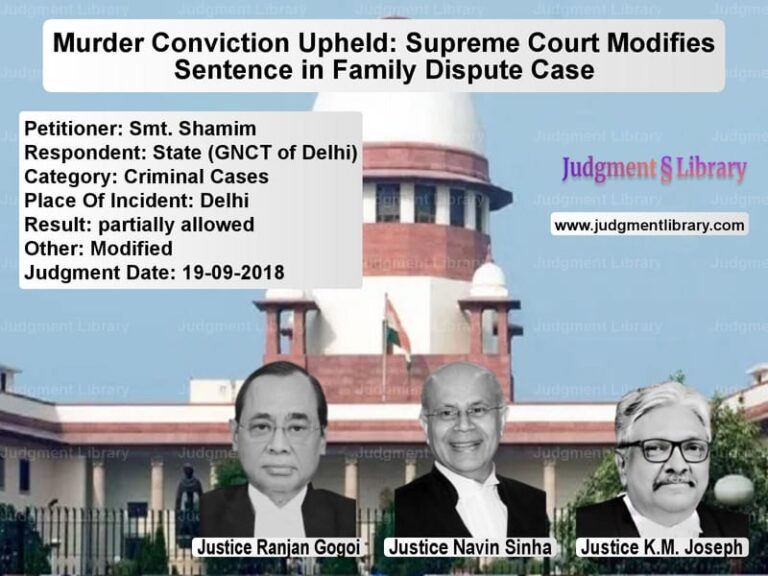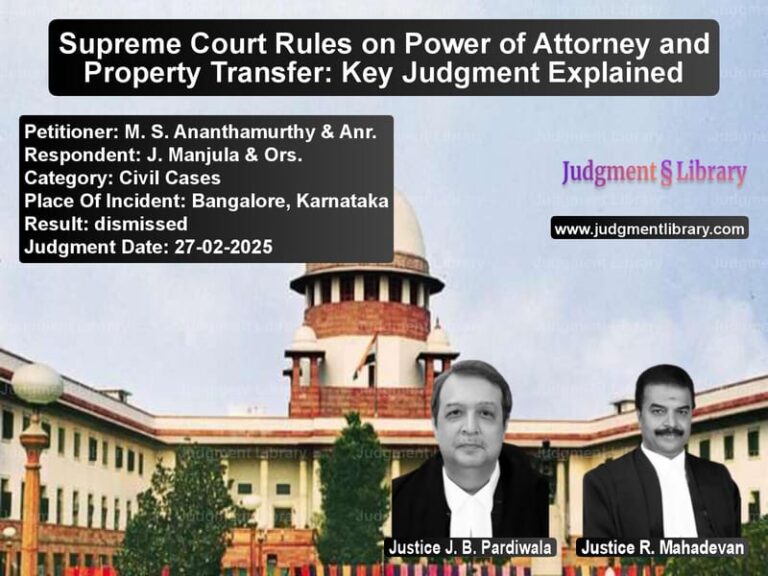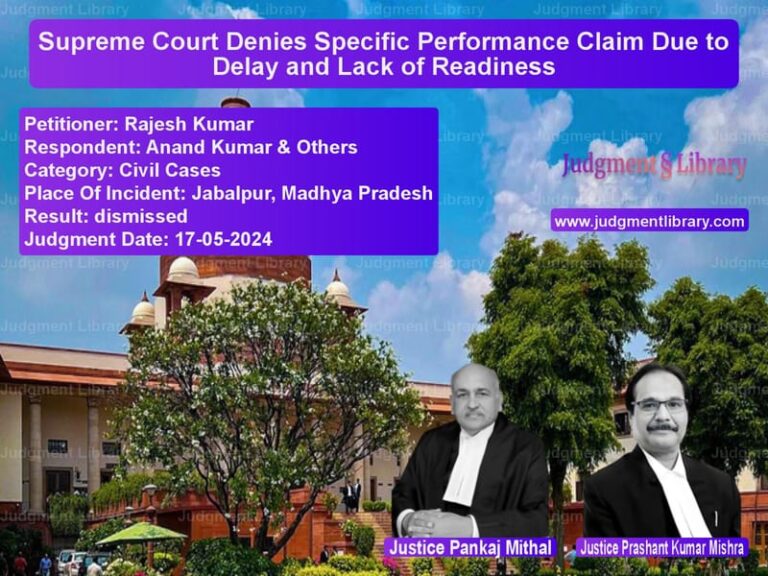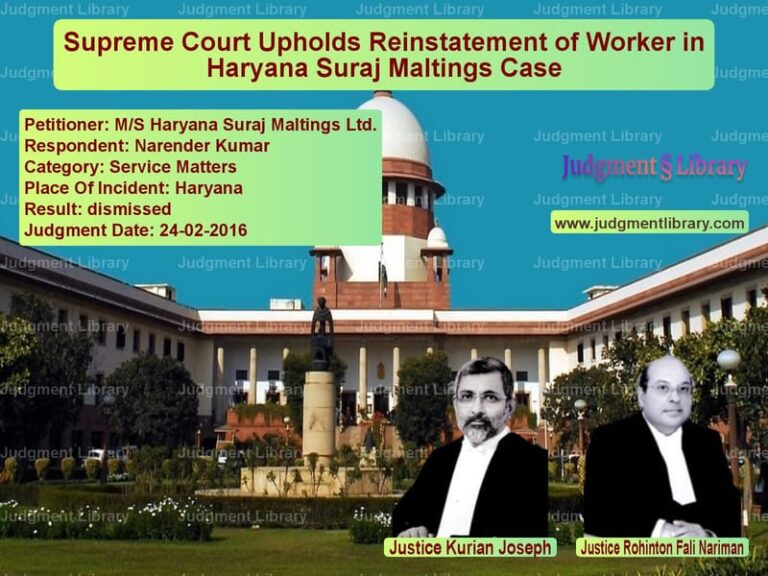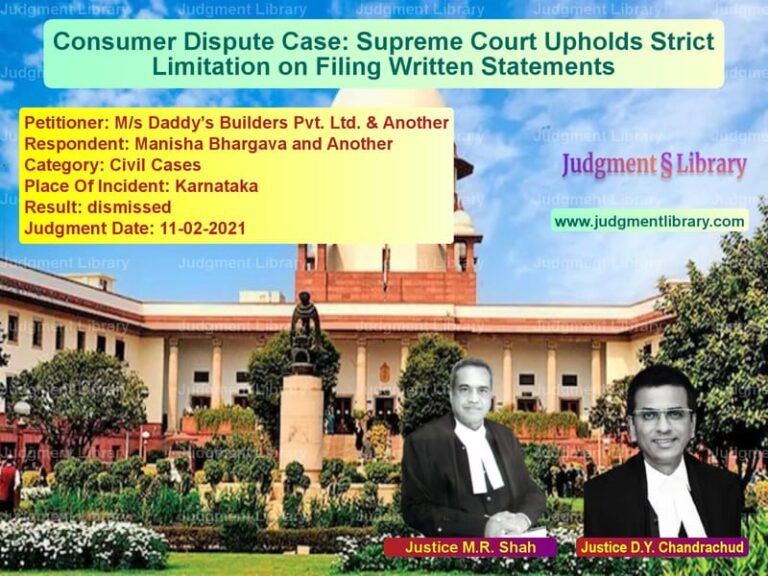Tax Exemption Dispute: Hindustan Lever Ltd. vs. Deputy Commissioner of Commercial Taxes
The case of Deputy Commissioner of Commercial Taxes vs. Hindustan Lever Limited revolves around a tax exemption dispute under the Karnataka Sales Tax Act, 1957. The primary legal issue was whether the company had violated the exemption conditions by incorporating sales tax into its product pricing.
The Supreme Court upheld the rulings of the Karnataka Appellate Tribunal and the Karnataka High Court, rejecting the state’s claim that Hindustan Lever had indirectly collected sales tax despite an exemption.
Background of the Case
The dispute originated when Hindustan Lever Limited (formerly Brooke Bond India Limited) operated a factory in Dharwad, Karnataka, manufacturing blended packet tea. The company had received a five-year sales tax exemption under an incentive scheme from the Government of Karnataka.
On December 20, 1996, an Assistant Commissioner of Commercial Taxes conducted an inspection at the factory and found that tea packets from both the Dharwad unit (exempted) and non-exempted units were priced the same. This led to an inference that the company had factored in sales tax within the price of the Dharwad unit’s tea, violating the exemption conditions.
Key Legal Issues
- Whether Hindustan Lever had indirectly collected sales tax despite claiming an exemption.
- Whether incorporating tax components in the final price constituted a violation of tax exemption conditions.
- Whether the state’s rejection of tax exemption was justified based on price uniformity.
- Whether the company was liable to pay back the taxes for the exemption period.
Arguments by the Parties
Petitioner’s (Deputy Commissioner of Commercial Taxes) Arguments
- The company violated the conditions of tax exemption by adding sales tax to the final price, even if not explicitly labeled as tax.
- The pricing of the exempted (Dharwad) and non-exempted (other units) tea was identical, which indicated an implicit tax collection.
- The company’s pricing policy misled consumers into paying tax-inclusive prices.
- Sales tax collected, even indirectly, must be remitted to the state treasury.
Respondent’s (Hindustan Lever Ltd.) Arguments
- The company’s pricing model was based on a uniform maximum retail price (MRP) policy across India.
- The Karnataka Standards of Weights and Measures Act required MRP labeling as “inclusive of all taxes.”
- Having the same MRP across India did not imply that sales tax was collected in Karnataka.
- The company clearly mentioned in invoices that the tea from the Dharwad unit was exempt from sales tax.
- The state’s claim was based on assumption rather than direct evidence of tax collection.
Tribunal and High Court Rulings
The Karnataka Appellate Tribunal ruled in favor of Hindustan Lever, stating:
“Mere mentioning of MRP does not by itself prove tax collection. The absence of a specific tax charge in the invoice supports the company’s claim of exemption compliance.”
The Karnataka High Court upheld this ruling, adding:
“The revenue authorities failed to show that Hindustan Lever collected tax separately. The claim that MRP included tax is insufficient to prove tax collection in violation of exemption conditions.”
Supreme Court’s Judgment
The Supreme Court upheld the decisions of the lower courts and dismissed the state’s appeal, observing:
“The burden of proving tax collection lies on the revenue department. The company’s uniform pricing strategy and compliance with exemption notification demonstrate that no tax was collected.”
Key Observations by the Court
- Sales tax is an indirect tax, but merely maintaining price uniformity across states does not imply tax collection.
- The Standards of Weights and Measures Act required companies to declare MRP as “inclusive of all taxes,” making such labeling mandatory.
- Invoices issued by Hindustan Lever clearly stated that the Dharwad unit’s products were exempt from sales tax.
- There was no evidence that sales tax was charged separately or remitted to the government.
- The Karnataka government’s assumption that uniform pricing meant implicit tax collection was not legally sustainable.
Final Judgment
The Supreme Court ruled:
- The company was entitled to retain its tax exemption.
- The state’s claim that tax was indirectly collected was unsupported by evidence.
- The revenue authorities had wrongly assumed tax inclusion based solely on price uniformity.
- The appeal was dismissed with Rs. 1,00,000 in costs awarded against the state.
Conclusion and Legal Impact
This ruling reinforces several key legal principles:
- Tax authorities bear the burden of proof in cases involving alleged tax collection.
- Uniform product pricing across states does not automatically imply tax collection in an exempted region.
- Legal compliance with exemption conditions must be assessed based on invoices and accounting records, not assumptions.
- Government must not deny legitimate tax exemptions based on unfounded interpretations.
The Supreme Court’s decision safeguards businesses against arbitrary tax demands and upholds the principle that tax collection must be explicit, not implied.
Judgment delivered by: Dipak Misra, N.V. Ramana
Judgment Date: June 30, 2016
The ruling serves as a significant precedent in tax exemption cases, ensuring that businesses are not unfairly penalized for following legally prescribed pricing and accounting practices.
Don’t miss out on the full details! Download the complete judgment in PDF format below and gain valuable insights instantly!
Download Judgment: Deputy Commissioner vs Hindustan Lever Limi Supreme Court of India Judgment Dated 30-06-2016-1741872459818.pdf
Direct Downlaod Judgment: Direct downlaod this Judgment
See all petitions in Tax Refund Disputes
See all petitions in Income Tax Disputes
See all petitions in GST Law
See all petitions in Judgment by Dipak Misra
See all petitions in Judgment by N.V. Ramana
See all petitions in dismissed
See all petitions in supreme court of India judgments June 2016
See all petitions in 2016 judgments
See all posts in Taxation and Financial Cases Category
See all allowed petitions in Taxation and Financial Cases Category
See all Dismissed petitions in Taxation and Financial Cases Category
See all partially allowed petitions in Taxation and Financial Cases Category


